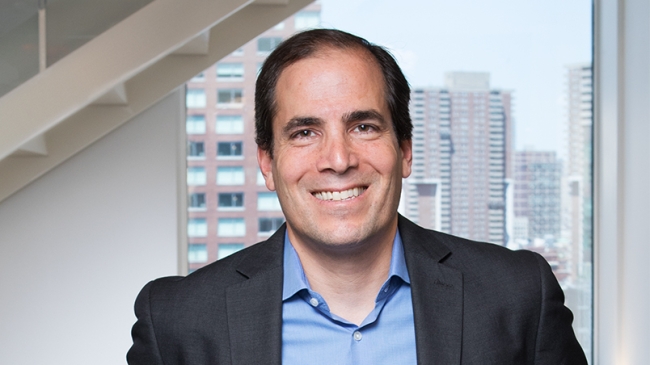You have /5 articles left.
Sign up for a free account or log in.

College Board
The Education Department has tapped College Board president Jeremy Singer to serve in a new role overseeing the rollout of next year’s Free Application for Federal Student Aid.
The news, provided first to Inside Higher Ed, comes as higher education groups have grown increasingly concerned that the agency won’t launch a working FAFSA on time—by Oct. 1—after this year’s application faced a number of delays and technical glitches. Education Secretary Miguel Cardona has repeatedly assured Congress, colleges and families that the form will be ready—and that the application will be better.
Bringing on Singer, a technology solutions expert who oversaw the development and launch of the new digital SAT, is the clearest signal yet that the department is shaking up its FAFSA approach as part of other “transformational changes” at the Office for Federal Student Aid (FSA). The form is key to unlocking billions in federal, state and institutional aid for millions of students.
“I’m honored to join a team whose work is vital to families across the country,” Singer said in a statement Friday. “It is impossible to overstate the importance of FAFSA in making college possible for millions of students. I’m eager to listen to students, families and educators who rely on FAFSA. We will do everything we can to deliver an improved experience to better serve students.”
Singer, who has been president of the College Board since 2013, is a familiar face for colleges and universities, some of whom have grown skeptical of the Education Department over its handling of the FAFSA. Singer will be taking temporary leave from the College Board to be the FAFSA executive adviser. In that role, he’ll lead FSA’s strategy on the 2025–26 FAFSA as well as work with the department “to strengthen internal systems and processes, bolster technical capabilities, and drive innovation to help ensure optimal performance” of the application’s launch.
“Jeremy brings deep experience having successfully led the development and introduction of major technology innovations in education, which will be integral to improving the FAFSA experience and ensuring millions of students and families can easily access the federal financial aid they are entitled to,” Cardona said in a statement.
In interviews Friday, College Board trustees praised Singer and his leadership style, expressing confidence in his ability to right the FAFSA ship. Derek Kindle, who’s vice provost for enrollment management at the University of Wisconsin at Madison, said that Singer will bring candor and a solutions-oriented approach to Federal Student Aid as well as experience with complex technological systems and issues.
“I think it’s a smart and savvy move to choose Jeremy because of his skillset,” he said. “I know Jeremy is the type of person who can get in a room, get people together and get them on the same page towards the mission.”
Gail Holt, dean of financial aid at Amherst College and a College Board trustee, said that Singer is well-versed in what families and institutions need and understands the financial aid timeline.
“So I’m excited about it,” she said. “It gives me hope and promise at a period that for a financial aid community has really been dwindling these many months.”
Following the various FAFSA delays and challenges, Holt said that her team at Amherst is “managing and pivoting as well as could be expected.” They’re about halfway through getting returning students their aid information.
Having Singer at the helm gives her more trust in the process for next year. “I can’t stress enough, if he’s got the right people with him, which I believe he will, he can set a course that will get us back on track,” she said. “... The College Board as a whole is very well familiar with how tools and resources can create a bridge for students to get from secondary school to higher ed to their future.”
Justin Draeger, president of the National Association of Student Financial Aid Administrators, said in a statement that the department needs to ensure the FAFSA mistakes are not repeated in the upcoming cycle.
"It’s encouraging to see the department is committing additional resources and manpower to course correct for next year, and reassuring to hear they remain committed to an October 1 launch," Draeger said. "It's imperative that the entire system, from application submission to processing, is operative on October 1, and that the Department clearly articulates that functionality to all stakeholders along the way."
In addition to hiring Singer, the department announced a series of listening sessions over the coming weeks to inform how the agency can better support students, families, colleges, states and other partners during the 2025–26 FAFSA cycle. Additionally, the department said Friday that the application for 2025–26 will “remain consistent” with this year’s form in order to minimize disruptions.
At the direction of Congress, the department overhauled the form for the 2024–25 academic year in order to make it simpler to use. Congress also dictated a number of changes to the underlying methodology that determines how much financial aid a student is eligible for, which opened up the Pell Grant to thousands of more students. The changes took longer than the department initially planned, and proved more challenging. The department’s news release said that the agency has made “significant progress” in addressing and resolving “major known issues” with the 2024–25 application.
Still, officials acknowledged the toll of the rocky rollout.
“The expansive scope and timeline of the changes for 24–25 has been challenging for students, families, institutions, states, and organizations that support them,” officials said in the release.
The department has received and processed more than 11.1 million aid applications. The pace of applications has concerned colleges who worried that the FAFSA issues would deter some students from pursuing postsecondary education. In March, the department had received 40 percent fewer applications than usual, though that gap has since closed to 8 percent, according to Friday’s news release.
To further close that gap, the department announced a $50 million FAFSA Student Support Strategy to fund efforts to boost FAFSA completion rates. So far, more than $30 million has been awarded to more than 180 organizations.
This article has been updated.




